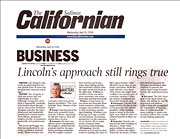Integrity Matters
April 19, 2006
Lincoln's approach still rings true

 Question: (E-235)
Question: (E-235)
Dear Jim:
Can integrity play a role in improving the current global
crisis of wars and international misunderstandings?
 Response:
Response:
Yes. Integrity is built one action and one relationship
at a time. Although turning the clock back is impossible,
studying wise leaders from the past can be instructive.
President Abraham Lincoln, the unsophisticated and essentially
uneducated country lawyer from Illinois, possessed insights
worthy of emulation, personally and professionally.
His horse-and-buggy wisdom has application in our rocket-propelled,
Internet world. These excerpts and concepts came from
Doris Kearns Goodwin's "The
True Lincoln" from "Master of the Game":
- Courage: Lincoln placed his three
most powerful rivals onto his Cabinet, explaining he
did not want to deny the nation their service.
- Compassion: His issue was slavery,
ours is immigration. He sought to understand the positions
held by his opponents, avoiding condemnation. He sought
to absorb their sorrows and hopes, sense their shifting
moods and mold their opinion with the right words and
deeds at the right time. Walking in another's shoes
was never more necessary than today - nationally and
internationally.
- Humor: Using funny stories about
his personal flaws broke tensions, redirected energies
and enabled conflict to find resolution outside rigid
thinking. Whether confronting road rage or political
intolerance, developing perspective on the sameness
of our feeble efforts might reduce tempers while increasing
understanding.
- Forgiveness: Lincoln behaved as
if no person dedicated to making the most of life's
opportunities could afford to waste time on personal
contention. With the right attitude, even those with
whom one might have conflicts can become part of a
positive solution, if they are neither humiliated nor
discarded along the way.
- Graciousness: Lincoln took responsibility
for the errors of his generals and cabinet members
while enabling them to stand in the limelight, even
when he had contributed heavily to their successes.
- Perspective: Lincoln saw beyond
the hard drinking of Ulysses S. Grant while appreciating
the general's ability to lead a war effort. When his
Secretary of State, John Seward, ignored his directive,
he resolved their conflicts to prevent the nation from
losing Seward's talents. He understood priorities.
- Self-control: The 16th President
wrote blunt letters to those with whom he was disappointed,
but seldom mailed them. He recognized the importance
of keeping lines of communication open, seeking to
repair relationships before they escalated into lasting
animosity.